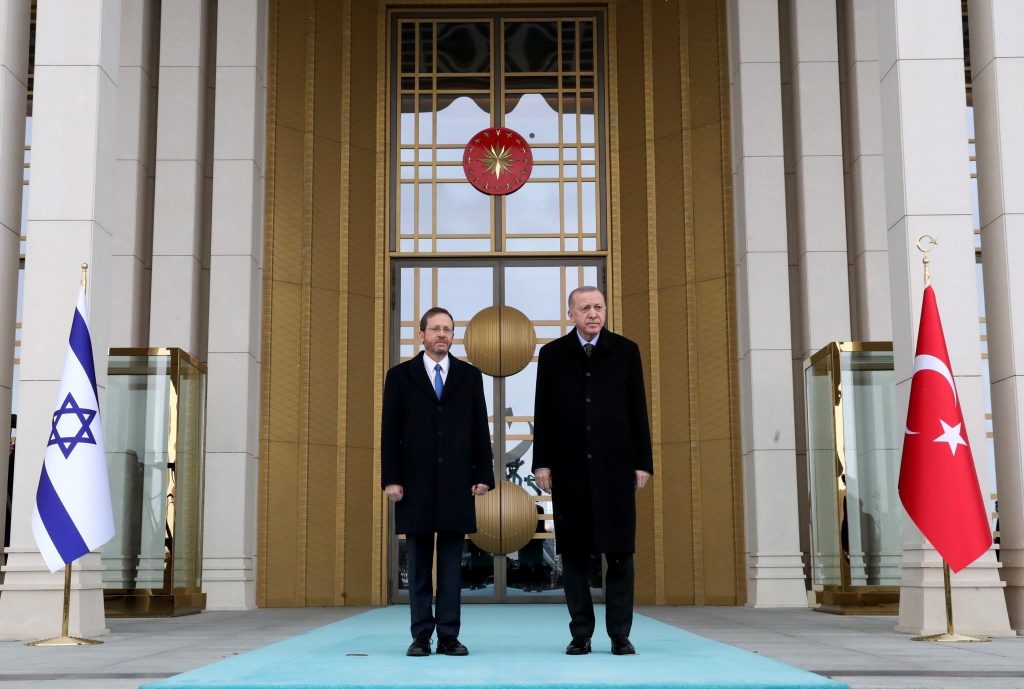Turkiye has announced it is halting all import and export transactions with Israel citing the “worsening humanitarian tragedy” in Gaza. Israel’s seven month military offensive in Gaza has left over 34,500 people dead, most women and children.
“All import and export transactions related to Israel, including all products, have been stopped,” Turkiye’s trade ministry said in a statement Thursday.
“Turkiye will strictly and decisively implement these new measures until the Israeli government allows an uninterrupted and sufficient flow of humanitarian aid to Gaza.”
Turkish President Recep Tayyip Erdoğan said on Friday that the trade ban aims to force Israel into a ceasefire and allow more humanitarian aid into the beleaguered strip.
It follows a decision taken by Ankara three weeks ago to place export trade restrictions to Israel on 54 products after the Israelis denied a request for Turkiye to airdrop aid into Gaza.
Responding to this latest development, a senior member of Israel’s government accused President Erdoğan of breaking trade agreements “by blocking ports for Israeli imports and exports.”
“This is how a dictator behaves, disregarding the interests of the Turkish people and businessmen, and ignoring international trade agreements,” Israeli Foreign Minister Israel Katz posted on X (formerly Twitter) on Thursday.
The Israeli Foreign Minister said that he had ordered his director-general to “immediately engage with all relevant parties in the government to create alternatives for trade with Turkey, focusing on local production and imports from other countries,” adding, “Israel will emerge with a strong and daring economy.”
Bilateral trade worth $7 billion
Official data shows the volume of trade between Turkiye and Israel was worth $7 billion last year Israel is in Turkiye’s top 20 export countries, with Israeli businesses buying Turkish goods and services worth $5.4 billion.
Among the top Turkish exports to Israel are iron, steel, vehicles, plastics, electrical devices and machinery. In the other direction, Turkiye’s annual imports from Israel was worth some $1.6 billion in 2023.
President Erdoğan has been a harsh critic of Netanyahu’s government and its military offensive in Gaza since the war began last October. Labelling Israel a “terror state” in November, Erdoğan said its brutal actions in Gaza amounted to “a genocide”.
Ahead of the start of Ramadan in March, the Turkish leader had said, “No matter what the Israeli leadership does, it cannot hide the reality that it is a murdering, cruel, criminal, lying, and fascist (government),” while calling for increased international pressure on Israel to ensure more humanitarian aid is allowed into Gaza.
Turkiye is one of the biggest donors of aid to Gaza, according to Israel’s Coordinator of Government Activities in the Territories. When Tel Aviv refused to allow the Turks to operate an aid airdrop, it prompted a backlash.
In a statement at the time, the Turkish Foreign and Trade Ministries both condemned Israel’s actions preventing access to “the most basic food, medical care and supplies” for the people of Gaza. In response, Turkiye placed a ban on the export of 54 products, including items that could be used for military purposes or construction, such as steel, cement, aluminium, marble and other construction materials, as well as equipment.
Israel launched a major military offensive against Gaza following a devastating attack in southern Israel by Hamas, which governs the territory, on 7 October, killing 1,200 people and abducting some 250 others. It was the worst attack on Jews since the Holocaust.
The intense Israeli bombardment of Gaza has turned much of the 28-mile long strip into rubble, destroying homes, hospitals and other vital infrastructure. With very limited aid getting into the territory, tens of thousands of people have been left on the brink of starvation.
Turkish-Israeli ties
Historically, Turkiye and Israel have enjoyed good relations. Turkiye was the first Muslim-majority country in the world to recognise Israel a year after the Jewish State was formed in 1948. However, relations have become more tense during Erdoğan’s long tenure at the helm of Turkish politics.

Diplomatic relations between the two countries became strained with Israel’s assault of Gaza in 2009, and they further deteriorated in the wake of the wing the Gaza Flotilla Incident of May 2010, when eight Turkish citizens and one Turkish-American were killed by Israeli troops while aboard a convoy attempting to break Israel’s blockade of Gaza. Turkiye recalled its ambassador and both countries downgraded diplomatic ties in the years that followed.
Relations started to improve in 2016, when Israel agreed to pay millions in compensation to the families of the victims of the Gaza Flotilla killings. Six years later, Israeli President Isaac Herzog visited Ankara on a state visit to meet with President Erdoğan.
A few months later, in May 2022, Yair Lapid, Israel’s Minister of Foreign Affairs, received his Turkish counterpart Mevlüt Çavuşoğlu in Tel Aviv – the first Turkish Foreign Minister to visit Israel in 15 years.
They agreed to relaunch a Joint Economic Commission and to begin working on a new civil aviation agreement. “Today,” Lapid declared, “we are initiating a new framework for improving our relations that not only we, but our children, will benefit from for years to come.” The following month, Lapid met his counterpart in Turkiye.
Later that year, the two countries reinstated their respective ambassadors and general consuls, thus restoring full diplomatic ties.
Regardless of the strained political environment, trade between the two countries has always continued. However, the recent conflict in Gaza has led to Turkish Islamists becoming increasingly critical of Erdoğan for allowing ‘business as usual’ with Israel. It ending up costing Erdoğan’s Justice and Development Party (AKP) dear in the Local Elections in March, where they came second in an election for the first time since 2002.
Ankara’s current trade ban will no doubt hurt Israel’s war-damaged economy in the short term, but it’s likely businesses will find alternatives to Turkish partners, products and ports going forward.
Main image, top, of a construction site of a new housing project stands in the Israeli settlement of Ma’ale Adumim on February 29, 2024 in Ma’ale Adumim, West Bank. Israel. Photo © Eddie Gerald / Alamy Stock Photo




